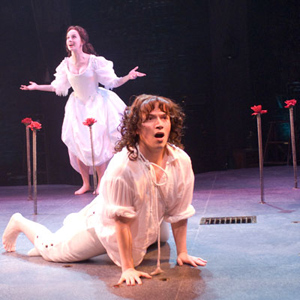| Sun | Mon | Tue | Wed | Thu | Fri | Sat |
|---|---|---|---|---|---|---|
| 1 | 2 | 3 | 4 | 5 | ||
| 6 | 7 | 8 | 9 | 10 | 11 | 12 |
| 13 | 14 | 15 | 16 | 17 | 18 | 19 |
| 20 | 21 | 22 | 23 | 24 | 25 | 26 |
| 27 | 28 | 29 | 30 | 31 |
CATEGORIES
RECENT ENTRIES
BLOG ROLL
Chicago Molière Theater
 Yesterday Court Theatre closed its production of The Illusion, Tony Kushner's adaptation of Pierre Corneille's 1636 L’Illusion Comique. The show marked Court's return to one of its strengths: the French Baroque. Exemplified by the works of its most renowned writer, Molière, the genre is considered a major pillar of the Western classic theater canon. Yet it is not Molière, but his English counterpart, William Shakespeare, whose name is often synonymous with “classic” theater in America.
Yesterday Court Theatre closed its production of The Illusion, Tony Kushner's adaptation of Pierre Corneille's 1636 L’Illusion Comique. The show marked Court's return to one of its strengths: the French Baroque. Exemplified by the works of its most renowned writer, Molière, the genre is considered a major pillar of the Western classic theater canon. Yet it is not Molière, but his English counterpart, William Shakespeare, whose name is often synonymous with “classic” theater in America.
Companies specializing in classic works often go so far as to include the bard’s name in theirs, from Chicago Shakespeare Theater to Washington, DC’s Shakespeare Theater Company and innumerable Shakespeare festivals in nearly every state. Yet few of these companies, despite their names’ implications, produce only Shakespeare's plays. Most, such as New York’s famed Shakespeare in the Park, make it a policy to include at least one work from “the canon” in each season. Their remaining plays vary widely, from the “Shakespearean” to the Shakespeare-inspired, and from generically “classic” works to productions of Willy Wonka and A Christmas Story. Nonetheless, these companies are considered Shakespeare specialists, and the actual Shakespeare plays are typically the highlights of their seasons.
From the beginning, the University of Chicago’s resident theater company and classics specialist has been different. Court Theatre’s inaugural 1955 season was made up entirely of plays by Molière. During its 55-year history, the theater has put up some 17 productions of 12 Molière plays, likely the most of any American company. As a result, although its history actually includes far more Shakespeare productions—44 in all—Court is known in theater circles as America’s Molière expert. And, like all those “Shakespeare” theaters producing not-quite Shakespeare plays, Court has frequently ventured into the Molière-ish, from its 1995 production of Celimene and the Cardinal and 1999 production of La Bête (modern works inspired by Molière’s style and characters) to plays by some of his successors in French theatrical history, including Marivaux and Voltaire. In fact, The Illusion is Court's second consecutive production of a non-Molière French Baroque play; in 2002 the company presented Jean Racine's Phèdre, aggressively adapted and directed by Joanne Akalaitis, AB’60.
As for The Illusion, Corneille described the play as “a strange monster,” “a bizarre and wild invention,” and “a caprice,” to which the Chicago Reader’s Tony Adler added “a calculated hodgepodge—a funny, sad, tricky fairy tale/melodrama, chock-full of high aspirations, low comedy, and unapologetic magic.” The Chicago Sun-Times’ Hedy Weiss wrote that “the work here is so good on every front…that you wish it could be airlifted whole onto the stage of the Comédie-Française.” What else would one expect from Chicago’s Molière theater?
Kyle Gorden, AB'00
RELATED LINKS
The Illusion: Corneille to Kushner (Court Theatre)
Chicago Sun-Times review
April 12, 2010
